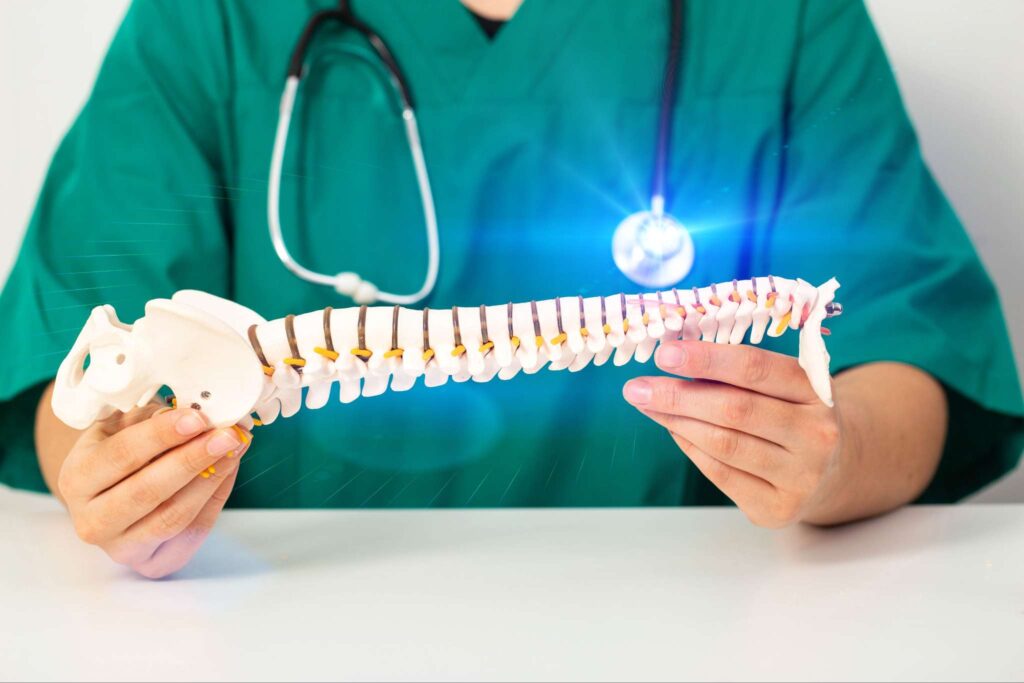
Have you ever felt like your back or neck pain is disrupting your daily life? Degenerative disc disease is a health condition in the spine that can cause pain and discomfort in the neck and back. This condition occurs when the discs between the vertebrae wear down over time, which decreases their ability to act as shock absorbers. By understanding what to avoid, you can learn how to better manage your degenerative disc disease symptoms and improve your quality of life.
5 Ways Degenerative Disc Disease Can Affect You
Degenerative disc disease is a condition that can significantly impact your everyday routines, from physical activities to your mental health. Here are common degenerative disc disease symptoms so you can understand how this disease might feel to you.
- Pain and Discomfort: Degenerative disc disease commonly causes pain in the back or neck, which can range from mild to severe. This pain is usually localized but can also radiate to other areas, like the arms or legs, if nerves are involved.
- Reduced Mobility: Degenerative disc disease can lead to stiffness and discomfort, which can limit your range of motion. Regular activities like bending, twisting, or reaching can be difficult or painful.
- Nerve Damage: As discs degenerate, they may herniate or bulge, pressing against nearby nerves. This can cause symptoms such as numbness, tingling, or shooting pain in the extremities.
- Muscle Weakness: When nerves get compressed, it can also lead to muscle weakness, especially in the arms and legs. This can negatively impact your balance, coordination, and overall strength.
- Sleep Disturbances: Neck or back pain from degenerative disc disease can interfere with sleep quality, leading to chronic fatigue. A lack of restful sleep can impact your concentration, memory, and healthy functioning.
Top 5 Things to Avoid with Degenerative Disc Disease
Whether you are looking for things to avoid with degenerative disc disease in the neck or lower back, here are some examples.
Avoiding a Sedentary Lifestyle
One of the most important things to avoid when managing degenerative disc disease is living a sedentary lifestyle. A lack of activity can weaken the muscles that support your spine, causing increased pain and stiffness. Here’s how you can increase your activity levels without overdoing it:
- Try Low-Impact Exercises: Activities like walking, swimming, or cycling are great ways to keep your body moving without putting too much strain on your spine. Gentle yoga or Pilates can also help with flexibility and reducing muscle tension. These low-impact exercises help promote flexibility and strength in your back and core muscles. On the other hand, degenerative disc disease exercises to avoid include high-impact activities.
- Take Frequent Breaks: If you have a desk job, make it a habit to stand up, stretch, and walk around every hour. Doing this can help relieve pressure on your spine and help prevent you from developing stiffness when you go from sitting to standing.
- Avoid Prolonged Bed Rest: While it might feel helpful to lie down when you’re in pain, too much bed rest can make your symptoms worse. Staying active within your limits supports healthy circulation, prevents muscle loss, and helps your spine stay more mobile.
Ignoring the Benefits of Ergonomic Support
A comfortable work setup can significantly impact people with degenerative disc disease. Poor ergonomics can put too much strain on the spine. Here are some tips to improve your ergonomics in your life:
- Set Up Your Workspace: You want a chair that supports the natural curve of your spine. Adjust your chair height so that your feet rest flat on the floor and your knees are bent at a 90-degree angle. It also helps to position your computer monitor at eye level to prevent neck strain by looking too far up or down.
- Try Ergonomic Accessories: Consider using lumbar support pillows, wrist rests, or standing desks to boost your comfort and support. Ergonomic keyboards and mice can also reduce strain on your neck and shoulders while working at a computer for hours.
- Use Proper Lifting Techniques: When you need to lift something, always bend at the knees, not at the waist, and use your legs to lift. Keeping the object close to your body also helps reduce the strain on your lower back.
Overlooking Nutrition and Hydration
A well-balanced diet plays a key role in managing health conditions like degenerative disc disease. Living with degenerative disc disease means getting the best nutrients to support your spinal health and reduce inflammation. Here are a few nutrition tips to consider:
- Stay Hydrated: Drinking plenty of water helps your whole body, including keeping your spinal discs hydrated, which helps maintain their flexibility and cushioning. A general recommendation is to aim for at least eight glasses of water a day.
- Eat Anti-Inflammatory Foods: You can try incorporating foods that are rich in omega-3 fatty acids, such as salmon, walnuts, and flaxseeds, which help reduce inflammation. Leafy greens, berries, and nuts are also great choices thanks to their anti-inflammatory properties.
- Avoid Processed and Sugary Foods: A degenerative disc disease diet should not include large amounts of processed or sugary foods because these can increase inflammation in the body and may worsen your symptoms. Instead, focus on whole foods that provide vitamins and minerals essential for your bone and joint health.
Forgetting to Manage Your Stress
Stress can significantly impact your whole body and can even lead to muscle tension that aggravates symptoms of degenerative disc disease. Here are some strategies to manage your stress effectively:
- Exercise Regularly: Exercise is a powerful stress reliever that also helps maintain physical health. You can even choose activities that you enjoy and find relaxing, like going for a gentle walk or taking a yoga class.
- Getting Plenty of Sleep: Getting enough rest is important for managing your stress and allowing your body to heal. Create a regular sleep routine and set up a restful environment to promote a better quality of sleep.
- Practice Relaxation Techniques: Techniques like deep breathing, mindfulness meditation, and progressive muscle relaxation can help calm your mind and reduce physical tension caused by stress.
Avoiding Routine Check-Ups with Your Doctor
Regularly visiting your doctor is important to managing your degenerative disc disease effectively. If you skip appointments, it can lead to missed opportunities to manage your symptoms and get the treatment you need.
- Attend Regular Check-Ups: Visit your doctor regularly to monitor the progression of your degenerative disc disease. They can help you best manage your symptoms and recommend various treatment options.
- Share Any Symptom Changes: If you notice any new or worsening symptoms, it’s important to let your doctor know. Addressing this as early as possible can prevent complications.
Treatment Options for Degenerative Disc Disease

Managing degenerative disc disease typically involves a combination of lifestyle modifications and professional treatments with a spine doctor near you. While it is a common part of the aging process, not everyone with degenerative disc disease experiences pain or disability. However, for those who do, a comprehensive treatment approach can significantly improve their quality of life.
Chiropractic Care
Chiropractic care is a noninvasive, drug-free treatment option that focuses on restoring proper alignment of your spine and joints. Your chiropractor will use spinal adjustments to reduce pressure on the affected discs and nearby nerves. These chiropractic adjustments can help reduce your pain, increase your range of motion, and promote better posture, which may reduce strain on the spine over time.
In addition to spinal adjustments, chiropractors may incorporate additional techniques like ultrasound, electrical stimulation, and therapeutic massage to support your healing and help reduce inflammation. If you’re dealing with degenerative disc disease, regular chiropractic visits can also offer long-term benefits as part of a personalized treatment plan.
Physical Therapy
Physical Therapy plays a crucial role in managing degenerative disc disease. A licensed physical therapist will create a customized treatment plan tailored to your specific condition and symptoms. This typically includes a combination of stretching and strengthening exercises aimed at supporting the spine and improving overall mobility.
Core strengthening is often a major focus of physical therapy because stronger abdominal and back muscles can help stabilize the spine and relieve stress on the discs. Therapists may also use manual techniques, posture training, and modalities like hot and cold therapy to further reduce pain and enhance recovery. Physical therapy not only helps reduce current symptoms but also teaches patients how to prevent future flare-ups by improving their body mechanics.
Medications
Medications can be an important part of managing pain symptoms, especially during acute flare-ups. Over-the-counter pain relievers like ibuprofen, naproxen, or acetaminophen are often recommended for managing mild to moderate discomfort. These medications can help reduce inflammation and pain, allowing patients to remain active.
For more severe or persistent pain, a physician may prescribe stronger medications such as muscle relaxants or nerve pain medications. Corticosteroid injections may also be considered to provide more targeted relief. It’s important to work closely with a healthcare provider to determine the safest and most effective medication along with other treatment techniques.
Lifestyle Modifications
In addition to medical treatments, lifestyle changes can also make a huge impact on managing degenerative disc disease. Maintaining a healthy weight reduces stress on the spine and can ease symptoms. Engaging in low-impact exercises like walking, swimming, or yoga helps keep the spine mobile and muscles strong.
Plus, ergonomic changes at work and home, such as using supportive chairs, maintaining good posture, and avoiding prolonged sitting or heavy lifting, can prevent symptom exacerbation. Quitting smoking is also essential because smoking reduces blood flow to spinal discs, which slows their healing and accelerates degeneration.
Surgical Options
Surgery is usually considered a last resort for people with degenerative disc disease whose symptoms do not improve with conservative treatments. Surgical procedures for degenerative disc disease aim to either remove the damaged disc or stabilize the spine.
Two of the most common surgeries include:
- Spinal Fusion: This procedure joins two or more vertebrae together to eliminate movement at a painful disc level. While this can reduce pain, it may also limit flexibility in that part of the spine.
- Artificial Disc Replacement: In some cases, the damaged disc is removed and replaced with an artificial disc designed to maintain more natural motion in the spine.
While surgery can provide significant relief for some, it also carries risks and a longer recovery time. A thorough consultation with a spine specialist is essential to determine if surgical intervention is appropriate.
How Your AICA Atlanta Doctor Can Help
Degenerative disc disease can be challenging to manage, but by avoiding these common pitfalls and trying healthier habits, you can reduce your symptoms. At AICA Orthopedics in Atlanta, we understand how much chronic back or neck pain can interfere with your everyday life. That’s why our team offers a multidisciplinary approach to spine care, including orthopedic specialists, neurologists, chiropractors, physical therapists, and pain management doctors, all under one roof.
When you visit AICA, we’ll develop a personalized treatment plan based on your unique condition, symptoms, and lifestyle goals. Whether you need chiropractic adjustments to realign your spine, physical therapy to strengthen supporting muscles, or advanced imaging to better understand the root cause of your pain, our experts are here to help. We also offer state-of-the-art diagnostics and noninvasive therapies to relieve pain and improve mobility without jumping straight to surgery unless it’s absolutely necessary.
Take the next step toward lasting relief. Schedule your consultation with AICA Orthopedics in Atlanta today and let our experienced team help you regain control of your health and get back to doing the things you love.
